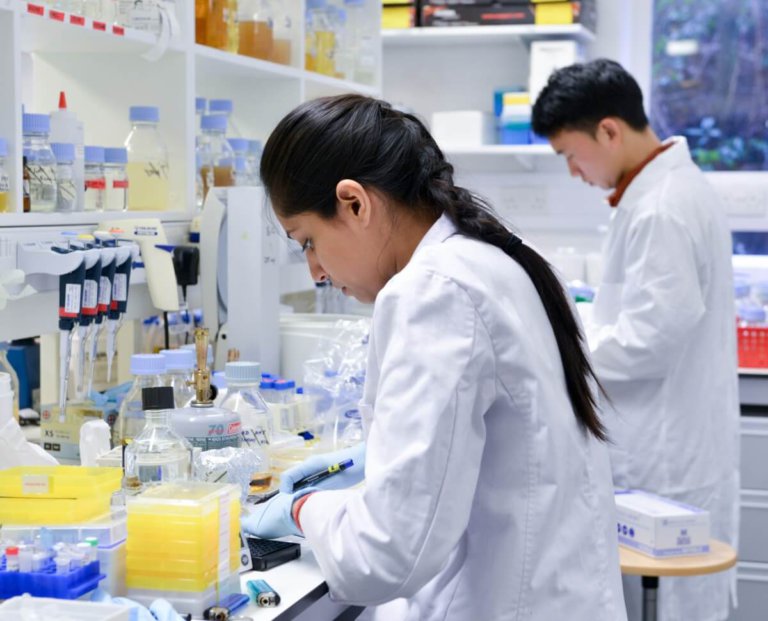
What’s it like to study the life sciences in vibrant UK? One international student shares her perspective why the University of Sussex’s School of Life Sciences is the ideal place to study this course.
When Azizah Islam decided to pursue a BSc in Biomedical Science at the University of Sussex, the student from Bangladesh did so without having attended many of the open days the universities held. What she knew was the University ranked highly in her subject of interest and was located close to London.
Today, the international student has no doubt that the University of Sussex is the right choice for her.
This research intensive public university in Brighton, England has carved itself a reputation for its quality teaching and research, solid employment rates and welcoming community – three features that Azizah was quick to discover since starting her course.
In classrooms and lecture halls, students are encouraged to stretch their knowledge and practical skills via engaging assignments, including conducting external research. To complement the technical skills gained through these, students at the School are also given numerous group assignments that help them develop soft skills, such as leadership and teamwork.

University of Sussex
“My course is designed with modules that helped me to obtain a broader knowledge and understanding around the area of my interest. The assignments that we are given are very engaging and prompts us to do external research,” she explained.
It’s a solid academic foundation that Azizah knows will serve her well for her future career. To supplement these classroom sessions, the University of Sussex’s illuminating research and focus on employability ensure every student graduate not just with the knowledge to succeed, but with the requisite practical skills too.
“We’re also allowed to conduct independent research, which involves making a work plan and figuring out how we plan to execute it, which helps exercise our decision-making abilities,” the 21-year-old said.
The university’s learning environment also helps students to broaden their horizons and equip them with the skills to succeed in their future careers. As part of her course requirements, the final year student is conducting an independent research under her supervisor, Dr Rhys Morgan.
“The project I’m working on is on acute myeloid leukemia. This is the first time that I’m carrying out an independent research,” she said.
As with any other student, Azizah was initially nervous and uncertain about how to proceed. That’s no longer the case, thanks to her supervisor, who was always on hand to support and guide her, be it through helping her understand the topic better or sharing materials so she could adopt the right work plan. Apart from faculty support, Sussex also holds weekly interactive seminars that helps students with questions they have about their dissertation.
“Managing my coursework as well as carrying out my own experiments have not been easy but I have now learned to manage my time better and certainly how to carry out multitasking efficiently. Through this project I have come across using tools such as various protein databases that I have not been aware of before and it has significantly improved my researching skills,” Azizah said.
“Sussex doesn’t only encourage students to take on responsibilities, but the university also ensures students have access to the right support to help us through each step of the way.”
“All in, I feel the course provides students with various transferable skills that are valuable within a professional working environment.”

University of Sussex – School of Life Sciences
Azizah’s story underscores Sussex’s School of Life Sciences’ success in helping students develop the crucial skills for a thriving career as a scientist and innovator. They engage with real-world problems and produce impact in fields as varied as cancer biology, drug discovery, neuroscience and biodiversity.
Teaching is strongly research-led and focused on enhancing the skills and prospects of the next generation of scientists and innovators. Attesting to this is data which shows an impressive 96 percent of Sussex’s Life Sciences students were in work or further study six months after graduating, according to the Destinations of Leavers from Higher Education Survey 2018.
Meanwhile, over 75 percent of their research activity is categorised as world-leading or internationally excellent by the Research Excellence Framework 2014 (REF2014).
Archery anyone?
Becoming a student at Sussex isn’t all work and no play; the university also offers a balanced student lifestyle with a host of extracurricular activities to cater to students with varied interests.
Azizah enjoys archery lessons the university holds on weekends, her favourite pastime on campus as this was how she has met some “really amazing” people.
“Whether you’re an undergraduate or a PhD student at Sussex, there’s bound to something that appeals to everyone,” she said.
With its stellar programmes, excellent faculty support and vibrant student lifestyle, it’s clear that becoming a Life Sciences student at Sussex will prove to be an unparalleled learning experience.
Follow the University of Sussex School on Facebook, Twitter, YouTube, Vimeo and Instagram
Liked this? Then you’ll love…
Research-led teaching at School of Life Sciences, University of Sussex
International student stories: Studying at Sussex’s School of Life Sciences







